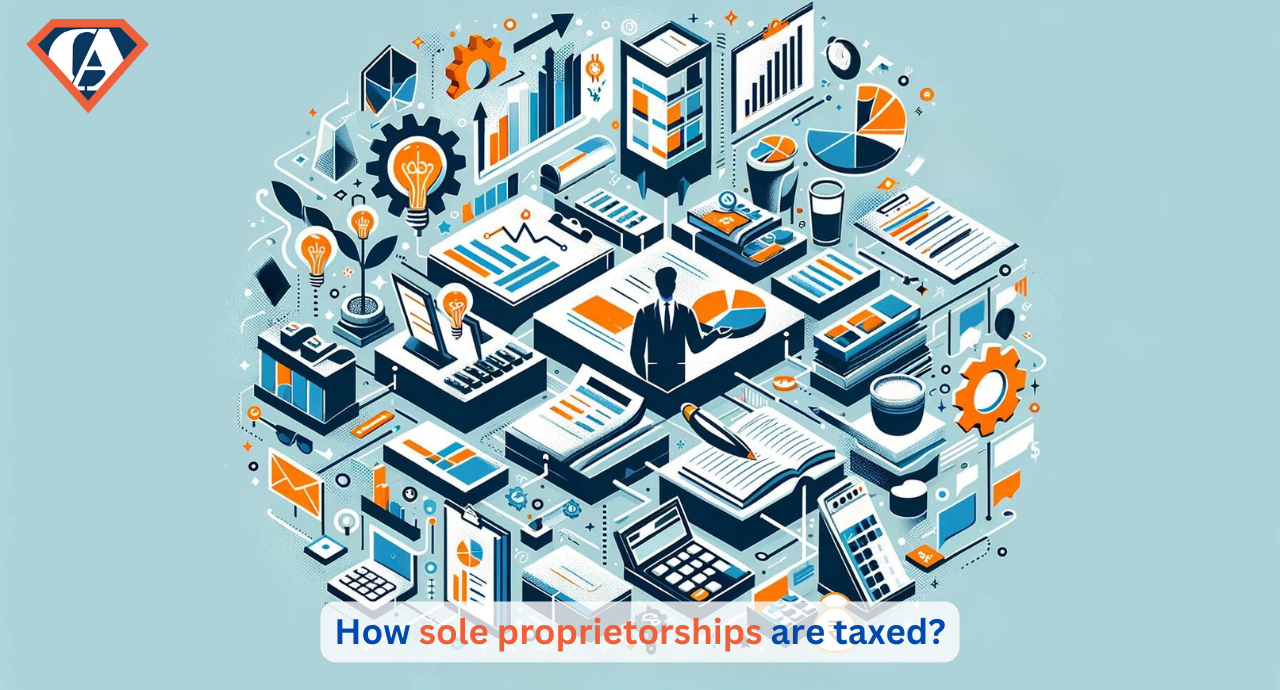Why Sole Proprietorship is the Best Form of Business
- Posted By SuperCA
- On 15 March

Introduction
The entrepreneurial journey begins with key decisions that can significantly influence the future success of the venture. Among these decisions, the choice of business structure stands out for its long-term implications on operations, taxation, and personal liability. Sole proprietorship, often celebrated for its simplicity and direct control, offers compelling advantages for entrepreneurs embarking on their business journey.
Simplicity in Setup and Operation
The allure of sole proprietorship often begins with its straightforward setup process. Unlike the complexities associated with corporations or partnerships, establishing a sole proprietorship can be relatively hassle-free.
- Minimal Paperwork: Requires significantly less bureaucratic paperwork compared to other business structures.
- Cost-Effective: Generally, there are no registration fees, making it an economical choice.
- Operational Freedom: Provides the owner with the liberty to make all business decisions, enhancing operational flexibility.
Actionable Tip: Check with your local business licensing office to understand the specific requirements in your area, as some regions may require a simple registration or business license even for sole proprietors.
Complete Control Over Decisions
The unmatched autonomy offered by sole proprietorship allows entrepreneurs to navigate their business journey with complete authority over every decision.
- Quick Decision Making: Sole proprietors can make business decisions quickly, without needing approval from partners or boards.
- Direct Involvement: Ensures the owner is directly involved in all facets of the business, from strategic planning to daily operations.
Real-Life Example: Imagine a sole proprietor in the catering business who decides to pivot their menu offerings based on new food trends. This direct control allows for immediate implementation of new ideas.
Tax Advantages
One of the most appealing aspects of sole proprietorship is the tax benefits it offers, making it financially attractive for many entrepreneurs.
- Pass-Through Taxation: Business profits are taxed once, avoiding the double taxation common in corporations.
- Personal Income Deduction: Business losses can be deducted from the owner's personal income, potentially reducing the overall tax liability.
Reminder: Keep diligent records of all business expenses and consult with a tax professional to maximize your tax advantages.
Ease of Dissolution
Should the need arise to close the business, sole proprietorships offer a streamlined process for dissolution.
- Less Legal Formality: Fewer steps are required to dissolve the business compared to other structures.
- Direct Control Over the Process: The sole proprietor manages the dissolution process, ensuring a smooth transition.
Consideration: Ensure all debts are paid and legal obligations met before formally ending the business to avoid personal liability issues.
Personal Connection With Customers
The intimate scale of a sole proprietorship often translates into stronger customer relationships.
- Personalized Service: Direct interaction with customers allows for tailored services and products.
- Brand Authenticity: Customers often appreciate the personal story and passion behind the business, enhancing loyalty.
Success Tip: Use social media platforms to share your business story and connect with your audience on a personal level, strengthening customer relationships.
Conclusion
The decision to pursue a sole proprietorship should be informed by a clear understanding of its advantages:
- Simplicity in setup and operation
- Complete control over business decisions
- Tax benefits and financial advantages
- Ease of dissolution when necessary
- Enhanced customer relationships through personal engagement
While it may not be the perfect fit for every business model, for many entrepreneurs, the benefits of a sole proprietorship align well with their goals of starting a business with minimal barriers and maintaining flexibility and control over their venture. Consider your business objectives, the nature of your industry, and your personal risk tolerance to determine if a sole proprietorship is the right choice for you
How SuperCA Can Facilitate Your Sole Proprietorship Journey
While the advantages of starting a sole proprietorship are clear, navigating the initial setup and ongoing compliance requirements can still be daunting for many entrepreneurs. This is where SuperCA steps in to streamline and support your business journey.
-
Ease of Business Registration: SuperCA simplifies the process of any required business and tax registrations, including obtaining a GST number, ensuring you start on the right legal footing.
-
Taxation and Compliance: With expertise in GST registration, filing, and ITR filing, SuperCA helps sole proprietors stay compliant with tax laws while maximizing their financial benefits.
-
Financial Management: From bookkeeping to ROC and ESI return filing, SuperCA offers comprehensive financial management services, allowing you to focus on growing your business.
-
Intellectual Property: Whether it's trademark registration or procuring an IEC code, SuperCA ensures that your business's intellectual property and licensing are in order, protecting your brand and products.
-
Strategic Growth Support: Beyond compliance, SuperCA assists with strategic registrations like MSME, which can offer additional benefits and support for your business.
Why Choose SuperCA? For sole proprietors looking to minimize administrative burdens and ensure compliance, SuperCA acts as a one-stop solution. Their professional expertise not only aids in the efficient setup of your sole proprietorship but also supports its growth and adaptation to regulatory changes. Partnering with SuperCA allows entrepreneurs to leverage professional advice and services, freeing them to concentrate on what they do best – running their business.
Frequently Asked Questions (FAQs) About Sole Proprietorship
Q1: Is a sole proprietorship suitable for any type of business?
A1: While a sole proprietorship is versatile and can suit many types of businesses, it's particularly beneficial for small, low-risk operations and entrepreneurs starting out. It may not be ideal for businesses that require substantial capital, face high liability risks, or intend to raise money from investors.
Q2: How does liability work in a sole proprietorship?
A2: In a sole proprietorship, the business owner is personally liable for all business debts and obligations. This means personal assets could be at risk if the business incurs debt or is sued. It's crucial to assess the potential risks and consider liability insurance.
Q3: Can a sole proprietor hire employees?
A3: Yes, sole proprietors can hire employees. However, they must obtain an Employer Identification Number (EIN) from the IRS (or local tax authority) and comply with employment laws, including payroll taxes and workers' compensation requirements.
Q4: What are the main differences between a sole proprietorship and an LLC?
A4: The key difference lies in liability protection. An LLC (Limited Liability Company) provides its owners (members) with limited liability, meaning their personal assets are generally protected from business debts and lawsuits. An LLC also offers more flexibility in taxation and can choose to be taxed as a sole proprietor, partnership, or corporation.
Q5: Do sole proprietors need to register their business name?
A5: If a sole proprietor operates under a name different from their own, they may need to file a "Doing Business As" (DBA) registration with their local government. This process varies by location, so it's essential to check local requirements.
Q6: How do I keep my personal and business finances separate in a sole proprietorship?
A6: It's wise to open a separate business bank account and use it for all business transactions. This practice not only helps in managing finances but also simplifies bookkeeping and tax filing.
Q7: Can sole proprietorships raise funding from investors?
A7: Generally, it's challenging for sole proprietorships to raise funds from investors since there's no distinction between the owner and the business, and the structure doesn't allow for issuing stocks. Entrepreneurs looking to raise capital might consider converting to a corporation or LLC.





